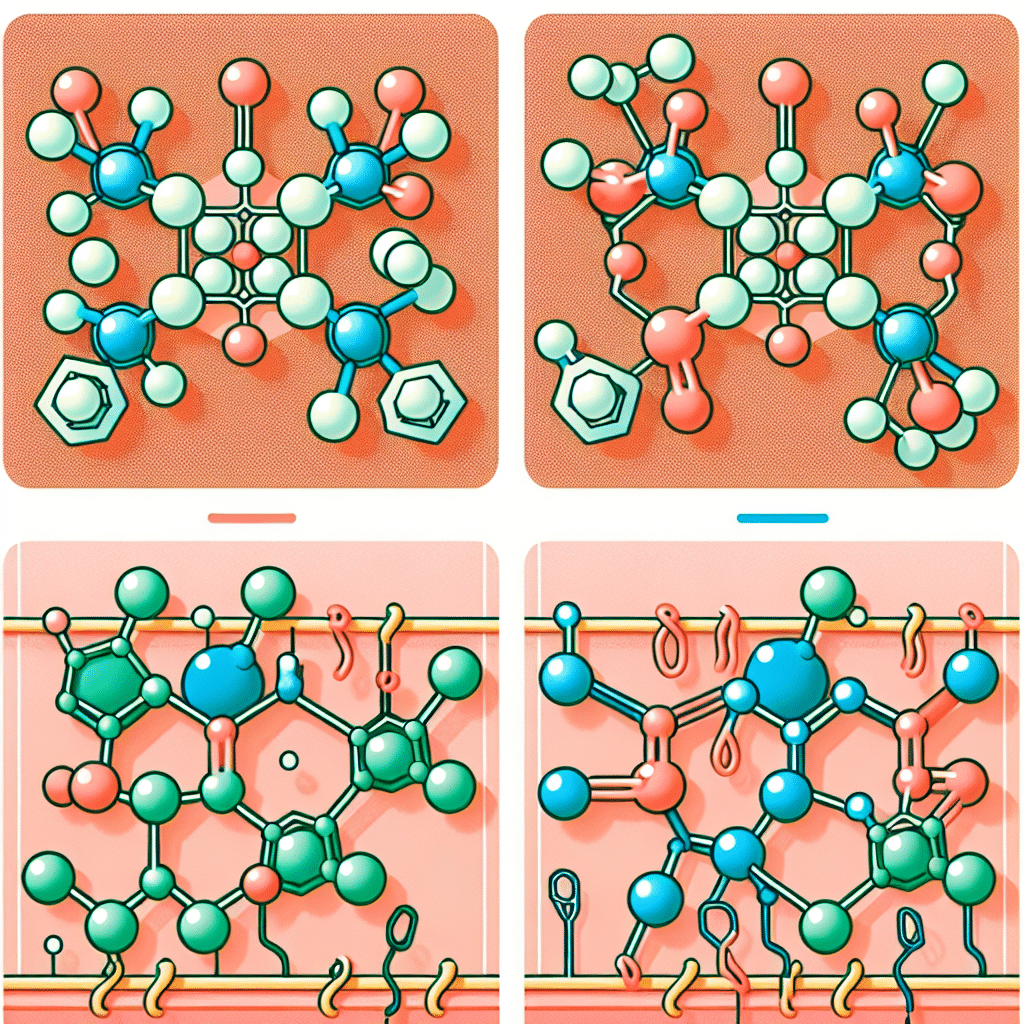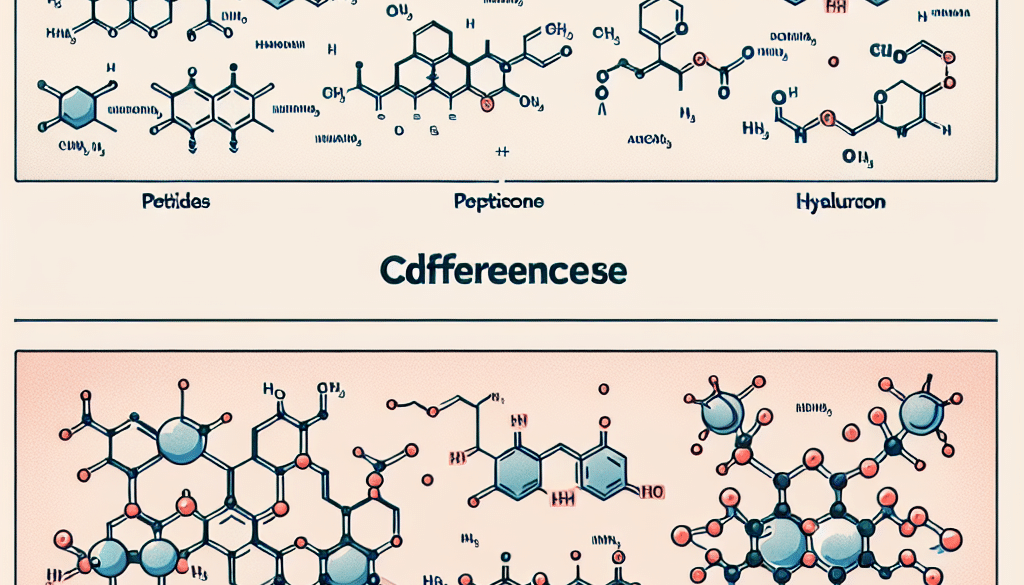Is Peptide The Same As Hyaluronic Acid?
-
Table of Contents
- Peptide vs. Hyaluronic Acid: Understanding the Differences
- What Are Peptides?
- What Is Hyaluronic Acid?
- Comparing Peptides and Hyaluronic Acid
- Function and Mechanism of Action
- Benefits for the Skin
- Usage in Skincare Products
- Can Peptides and Hyaluronic Acid Be Used Together?
- Choosing the Right Product for Your Skin
- Case Studies and Statistics
- Conclusion: Understanding the Unique Benefits of Peptides and Hyaluronic Acid
- Discover ETprotein’s Premium Protein Products
Peptide vs. Hyaluronic Acid: Understanding the Differences

In the realm of skincare and anti-aging products, peptides and hyaluronic acid are two ingredients that have garnered significant attention. While both are touted for their skin-rejuvenating properties, they are not the same. This article delves into the science behind these two compounds, their benefits, and how they differ from each other.
What Are Peptides?
Peptides are short chains of amino acids, which are the building blocks of proteins. In skincare, peptides are used for their ability to signal the skin to produce more collagen, which is the protein responsible for skin’s firmness and elasticity. There are various types of peptides, each with specific functions, such as signaling, enzyme inhibitory, neurotransmitter inhibitory, and carrier peptides.
- Signaling Peptides: Encourage the skin to produce more collagen and elastin.
- Enzyme Inhibitory Peptides: Slow down the natural breakdown of collagen in the skin.
- Neurotransmitter Inhibitory Peptides: Help reduce the appearance of expression lines by inhibiting muscle contractions.
- Carrier Peptides: Deliver trace elements like copper to the skin to help with wound healing and enzymatic processes.
What Is Hyaluronic Acid?
Hyaluronic acid (HA) is a naturally occurring polysaccharide found in the human body, particularly in connective tissues, eyes, and skin. It is known for its incredible ability to retain moisture—up to 1,000 times its weight in water. In skincare, HA is used for its hydrating properties, which can help to plump up the skin and reduce the appearance of fine lines and wrinkles.
Comparing Peptides and Hyaluronic Acid
While both peptides and hyaluronic acid offer anti-aging benefits, they function differently within the skin.
Function and Mechanism of Action
Peptides act as messengers that trigger the skin to perform specific functions, such as increasing collagen production. On the other hand, hyaluronic acid is a humectant that draws moisture into the skin, providing hydration and fullness.
Benefits for the Skin
Peptides can help improve skin texture, reduce the appearance of fine lines and wrinkles, and enhance skin firmness. Hyaluronic acid primarily offers hydration, which can temporarily smooth out wrinkles and give the skin a more youthful appearance.
Usage in Skincare Products
Peptides are often found in serums, creams, and masks targeted towards anti-aging. Hyaluronic acid is also prevalent in a variety of skincare products, including serums, moisturizers, and even injectable fillers.
Can Peptides and Hyaluronic Acid Be Used Together?
Yes, peptides and hyaluronic acid can be used together in a skincare routine. In fact, combining them can lead to enhanced results, as they complement each other’s actions. Peptides can help rebuild and strengthen the skin’s structure, while hyaluronic acid provides the necessary hydration to keep the skin plump and supple.
Choosing the Right Product for Your Skin
When selecting skincare products, it’s essential to consider your skin type and concerns. For those looking to address dryness and dehydration, hyaluronic acid is a must-have. If you’re targeting signs of aging like loss of firmness and wrinkles, incorporating peptides may be beneficial.
Case Studies and Statistics
Several studies have demonstrated the efficacy of peptides and hyaluronic acid in skincare. For instance, a study published in the International Journal of Dermatology found that a cream containing peptides and other anti-aging ingredients significantly improved skin texture and reduced wrinkle depth after 12 weeks of use.
Another study in the Journal of Clinical and Aesthetic Dermatology showed that a hyaluronic acid-based filler was effective in reducing nasolabial fold wrinkles for up to one year post-treatment.
Conclusion: Understanding the Unique Benefits of Peptides and Hyaluronic Acid
In conclusion, peptides and hyaluronic acid are distinct compounds with different mechanisms of action and benefits for the skin. Peptides are primarily involved in signaling the skin to produce more collagen, improving firmness and reducing wrinkles. Hyaluronic acid excels in hydrating the skin, leading to a plumper, more youthful appearance. When used together, they can provide a comprehensive approach to anti-aging skincare.
Discover ETprotein’s Premium Protein Products
If you’re interested in high-quality protein products, consider exploring ETprotein’s offerings. Their range includes organic rice protein, pea protein, and various seed proteins, as well as L-(+)-Ergothioneine (EGT) in different grades suitable for nutraceutical, pharmaceutical, and cosmetic applications. With a commitment to non-GMO, allergen-free products with high purity levels, ETprotein is a reliable choice for your protein needs.
About ETprotein:
ETprotein, a reputable protein and L-(+)-Ergothioneine (EGT) Chinese factory manufacturer and supplier, is renowned for producing, stocking, exporting, and delivering the highest quality organic bulk vegan proteins and L-(+)-Ergothioneine. They include Organic rice protein, clear rice protein, pea protein, clear pea protein, watermelon seed protein, pumpkin seed protein, sunflower seed protein, mung bean protein, peanut protein, and L-(+)-Ergothioneine EGT Pharmaceutical grade, L-(+)-Ergothioneine EGT food grade, L-(+)-Ergothioneine EGT cosmetic grade, L-(+)-Ergothioneine EGT reference grade and L-(+)-Ergothioneine EGT standard. Their offerings, characterized by a neutral taste, non-GMO, allergen-free attributes, with L-(+)-Ergothioneine purity over 98%, 99%, cater to a diverse range of industries. They serve nutraceutical, pharmaceutical, cosmeceutical, veterinary, as well as food and beverage finished product distributors, traders, and manufacturers across Europe, USA, Canada, Australia, Thailand, Japan, Korea, Brazil, and Chile, among others.
ETprotein specialization includes exporting and delivering tailor-made protein powder and finished nutritional supplements. Their extensive product range covers sectors like Food and Beverage, Sports Nutrition, Weight Management, Dietary Supplements, Health and Wellness Products, and Infant Formula, ensuring comprehensive solutions to meet all your protein needs.
As a trusted company by leading global food and beverage brands and Fortune 500 companies, ETprotein reinforces China’s reputation in the global arena. For more information or to sample their products, please contact them and email sales(at)ETprotein.com today.














